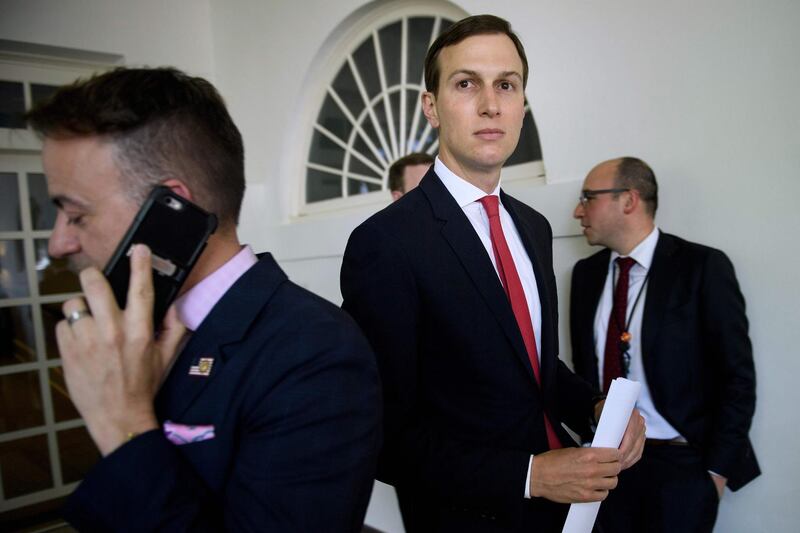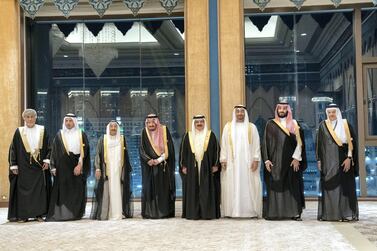Palestinians condemned Jared Kushner, the son-in-law of US President Donald Trump, over his comments in a rare interview on Sunday evening in which he expressed doubt that the Palestinians could self-govern.
Mr Kushner, a senior White House adviser and architect of the White House peace plan to end the decades-long conflict, told the Axios on HBO programme, "I do think they should have self-determination".
But he said it would be a high bar if they were to become free of a crippling Israeli military occupation in East Jerusalem and the West Bank.
“The hope is that they, over time, will become capable of governing,” Mr Kushner said.
They will “need to have a fair judicial system, freedom of press, freedom of expression, tolerance for all religions” before they can attain self-determination.
He declined to reveal details of the plan, part of which will be unveiled at an economic workshop in Bahrain this month.
But his comments rankled Palestinian officials, who said that the right to a sovereign state must no longer be denied because of American and Israeli excuses that they say block the way to a two-state solution.
"It is not news for us that the efforts of the Trump team are not in the direction of an independent, sovereign and contiguous State of Palestine, but towards that of normalisation of the Israeli colonial occupation over the land and people of Palestine," Saeb Erekat, Secretary General of the Palestine Liberation Organisation, told The National.
“It's our inalienable, sacred, long overdue and internationally recognised right to be free. Our right to self-determination has been systematically denied by Israel, now with the support of the US.”
Mr Kushner has previously suggested that the plan would not propose statehood for the Palestinians.
In a Twitter response, Mr Erekat said that the Trump administration was “planning prosperity for the settlers” and called on Arab states “not to talk to these settlers”.
He identified Mr Kushner, Middle East envoy Jason Greenblatt and US ambassador to Israel David Friedman by name.
Mr Kushner and Mr Friedman have close ties to Beit El, one of the most hardline settlements in the occupied West Bank.
Another Palestinian official was more scathing about Mr Trump's son-in-law.
“I think Kushner deserves a brain but I’m not certain that he can use it,” the official said.
The Palestinians say they will reject the “deal of the century” before it has been released, because it will be biased in favour of Israel.
The high suspicion in Ramallah has developed after moves by the US that have aided Israeli Prime Minister Benjamin Netanyahu.
Mr Trump relocated the US embassy from Tel Aviv to Jerusalem, recognised the city as Israel’s, and cut all aid to the UN refugee agency and to hospitals in occupied East Jerusalem that treat sick Palestinians.
The Palestinians cut all public contact with American officials after the embassy move was announced in December 2017.
On their lack of trust for the Trump team, Mr Kushner said: “I’m not here to be trusted.”.
He said the Palestinians should judge the plan based on its contents and whether it provides “a pathway to a better life”.
But the economic aspects of the deal, which will be introduced in Bahrain, will not be presented to the Palestinian Authority, which operates limited self-rule in the occupied West Bank, because they say they will not attend.
Also absent will be the UN envoy for the Middle East peace process, Nickolay Mladenov, who was not invited.
Members of the Trump administration have cast doubt on the success of the deal because of its content.
US Secretary of State Mike Pompeo said on Sunday in a closed-doors meeting with American Jewish leaders that “one might argue” the peace plan was “unexecutable” and “might not gain traction” because of what it did and did not offer.
"It may be rejected. Could be in the end, folks will say, 'It's not particularly original, it doesn't particularly work for me,' that is, 'It's got two good things and nine bad things, I'm out'," he said in a recording of the meeting obtained by The Washington Post.
US officials have been tight-lipped for more than two years about the deal and its chances of success, but Mr Pompeo's comments represented some of the most honest views from inside the team crafting the plan in Washington.
“I get why people think this is going to be a deal that only the Israelis could love,” he said. “I understand the perception of that. I hope everyone will just give the space to listen and let it settle in a little bit.”
The interview was recorded before Mr Kushner’s visit to Jerusalem last week on a trip that included stops in Morocco and Jordan.
The unveiling of the plan was delayed after early elections were called in Israel, which were won by Mr Netanyahu.
It may face further delays now that an unprecedented second election has been called for September after he failed to form a coalition by a set deadline.






